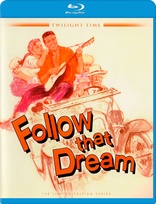Follow That Dream Blu-ray Movie
HomeFollow That Dream Blu-ray Movie 
Limited Edition - SOLD OUTTwilight Time | 1962 | 109 min | Not rated | Aug 12, 2014
Movie rating
6.7 | / 10 |
Blu-ray rating
| Users | 4.0 | |
| Reviewer | 2.5 | |
| Overall | 2.6 |
Overview
Follow That Dream (1962)
When the Kwimper family car runs out of gas on a new Florida highway and an officous state supervisor tries to run them off, Pop Kwimper digs in his heels and decides to do a little homesteading. He and his son Toby and their "adopted" children - Holly, Ariadne and the twins - start their own little community along a strip of the roadside. The fishing is good and the living is easy until the mob sets up a gambling operation and the state supervisor sics a sexy social worker on the Kwimpers in an effort to take away Ariadne and the twins.
Starring: Elvis Presley, Arthur O'Connell, Anne Helm, Joanna Moore, Jack KruschenDirector: Gordon Douglas
| Musical | 100% |
| Comedy | Insignificant |
Specifications
Video
Video codec: MPEG-4 AVC
Video resolution: 1080p
Aspect ratio: 2.35:1
Original aspect ratio: 2.35:1
Audio
English: DTS-HD Master Audio Mono (48kHz, 24-bit)
Music: DTS-HD Master Audio Mono
Subtitles
English SDH
Discs
50GB Blu-ray Disc
Single disc (1 BD)
Playback
Region A, B (C untested)
Review
Rating summary
| Movie | 2.0 | |
| Video | 4.0 | |
| Audio | 4.0 | |
| Extras | 1.0 | |
| Overall | 2.5 |
Follow That Dream Blu-ray Movie Review
You might as well, since this film will probably put you right to sleep.
Reviewed by Jeffrey Kauffman August 26, 2014There must have been something in the water (or whatever it is Hollywood types were drinking back then) in 1962, for not only did the lackluster Elvis Presley film Follow That Dream hit theaters that year with its depiction of country bumpkins attempting to make their way in the big, wide, civilized world, a little television series called The Beverly Hillbillies with much the same general premise debuted in September of that year. There are a number of salient differences between the two, of course, even if Elvis’ character of Toby Kwimper seems more than a bit reminiscent of sweet but dunderheaded Jethro Clampett from the long running CBS sitcom. The most salient of these differences is the fact that the Clampetts had money—a lot of it, in fact, due to Jed’s fortuitous discovery of “Texas tea” on his property. In Follow That Dream, the extended Kwimper family (which includes several adoptees, a point which will become a major plot device) seems to be living off the government dole. Pop Kwimper (Arthur O’Connell) is a vagabond who makes allusions to collecting unemployment, while Toby himself is on “total and complete disability” due to having injured his back in the Army. There are some passing attempts to satirize this situation in Charles Lederer’s screenplay (culled from a novel called Pioneer, Go Home! by one Richard P. Powell), but it’s not clear exactly what or whom is being satirized. The Kwimpers are supposed to be the good guys, homesteading a little piece of property next to a brand spanking new Florida highway where they end up due to an early misadventure, and meddling government types are at least putatively some of the villains in the film. But the film never really capitalizes on this socioeconomic and political subtext, and instead goes off on a number of detours that see the Kwimpers fight both social workers (who want to take the adopted kids away) as well as nefarious gangsters who decide to homestead right next door to the family. Common wisdom suggests most sixties Elvis film efforts are fairly shabby, and while there are certainly exceptions to this general rule, Follow That Dream could probably be held up as Exhibit A for anyone promoting this hypothesis.
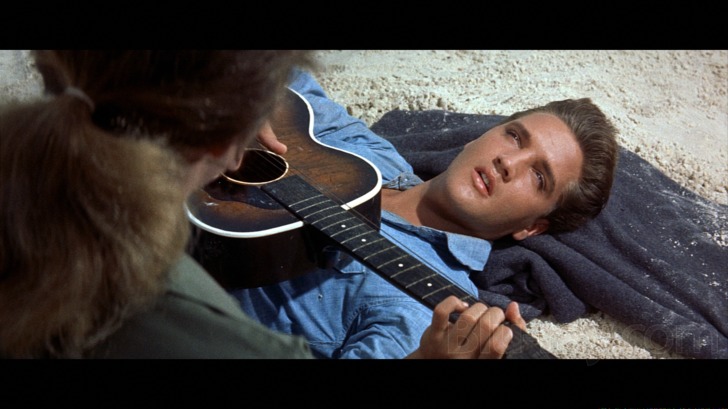
In an opening scene which is (again) more than a bit reminiscent of how The Beverly Hillbillies used to open each week, we see the Kwimper family tooling down a road in their overstuffed jalopy, with the seats totally filled by family members. When Pop decides not to heed a sign that warns people to stay off a new stretch of highway, the family finds itself stranded when the old Model A runs out of gas. Toby and his adopted sister Holly (Anne Helm) start to make things comfortable for Pop and the three younger kids, though Toby lets Holly know that Holly’s “nesting” tendencies are a turn off for a guy like Toby who is adamantly against getting married. (While there’s a certain squirm worthy subtext to the romantic angle between these ostensible “siblings”, including an overt mention of that dangerous word “sex”, things are played pretty straight-laced here, as might be expected from a 1961-62 film.)
Soon enough a fussy highway inspector named H. Arthur King (Alan Hewitt) shows up, demanding the Kwimpers get off of state land before the Governor shows up to dedicate the highway. Of course, the Governor arrives early and informs the Kwimpers that since they’ve erected a shack of sorts to stay out of the blazing Florida sun, they qualify for the state’s “homesteading” act, and the land on which they’ve camped will be theirs if they stick it out for six months. It’s completely ludicrous, of course, but there wouldn’t be a film (such as it is) without such patent artifice.
Soon enough yet another government type, this time a comely social worker named Alisha (Joanna Moore), shows up to check on the welfare of the Kwimpers’ adoptive brood. Alisha makes a none too subtle play for Toby, which Toby (being averse to commitment, of course) rejects, setting one of the film’s two central conflicts in motion when Alisha attempts to have the younger children removed from the protective custody of Pop Kwimper. Meanwhile, some nasty criminals (played by Jack Kruschen and Simon Oakland) open a “casino” (in a trailer!) next door to the Kwimpers and go to a number of extremes to remove the Kwimpers from the area. It’s all relentlessly formulaic and predictable, and not even Elvis’ considerable charisma can do much to alleviate the tedium.
That somewhat tired quality seeps through to the five fairly forgettable songs that are shoehorned into the film. None of the five shares writers, though there are certainly some decent journeyman names among the composers and lyricists, including frequent Elvis film contributor Sid Wayne, Jerry Livingston, Mack David and Sherman Edwards. (Edwards would go on to theatrical fame by penning 1776, but he had already tasted Top 40 success with Sid Wayne by writing “See You In September”, which hit the charts in both 1959 and 1966.) The songs here are simply serviceable, nothing more, nothing less, and even Elvis seems to be uninspired by them. (Note how often director Gordon Douglas stages the tunes with Elvis lying flat on his back on the Florida sand, as if even the director expected his star to nod off into nap time at any given moment.)
The sad thing about all of this (and several other of Elvis’ sixties output) is that the star obviously had presence to burn, but he kept getting shoved into substandard fare. When he was challenged (as he was in Flaming Star), Elvis proved to be a more than capable actor. In a property like Follow That Dream, he simply appears to be coasting. That’s good for creating the illusion of a breeze, at least for a little while, but Florida is an awfully flat place and the film, like the Kwimpers’ dilapidated jalopy, simply stalls and never gets out of its too comfortable rut.
Follow That Dream Blu-ray Movie, Video Quality 
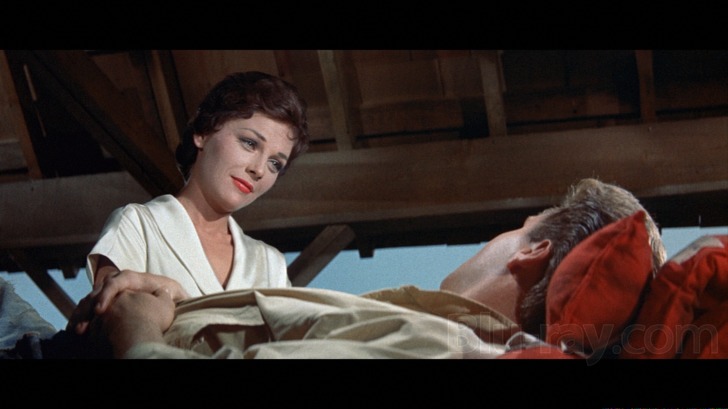
Follow That Dream is presented on Blu-ray with an AVC encoded 1080p transfer in 2.35:1. Elements are in very good condition, and while my dislike of Deluxe often colors (sorry) my reaction to the palette in films of this vintage, things look really good here most of the time, with blues especially robust. However, there does appear to be some intermittent slight fade to brown (take a look at the flesh tones and especially the "red" of the Cadillac fin and bunting in screenshot 12). Grain is effectively managed, giving a nicely organic appearance to the proceedings. There's a combination of location footage (which often looks great) and rear projection (which can sometimes look surprisingly shoddy), with varying levels of sharpness resulting. There are no signs of digital tinkering here, and fans of Follow That Dream should be generally quite pleased with this release.
Follow That Dream Blu-ray Movie, Audio Quality 
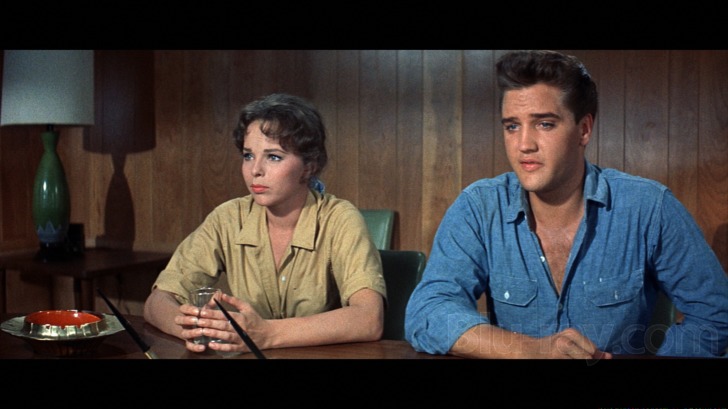
Follow That Dream features a lossless DTS-HD Master Audio Mono mix which supports both the middling song score as well as dialogue and a few sound effects very well. There's actually some good midrange (more so in the soundtrack than the isolated score, in my opinion), giving those great Jordanaires backup vocals some real oomph. Dialogue comes through very clearly and cleanly in this problem free track.
Follow That Dream Blu-ray Movie, Special Features and Extras 
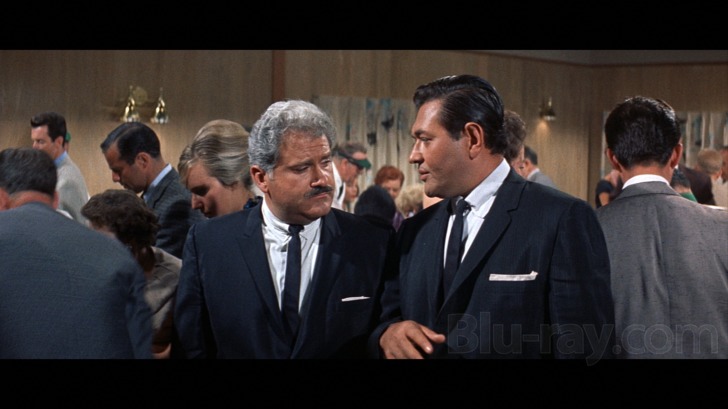
- Original Theatrical Trailer (1080p; 2:25)
- MGM 90th Anniversary Trailer (1080p; 2:06)
- Isolated Score Track is presented in DTS-HD Master Audio Mono, but to my ears the actual soundtrack iteration sounds a bit fuller, especially in the lower midrange.
Follow That Dream Blu-ray Movie, Overall Score and Recommendation 
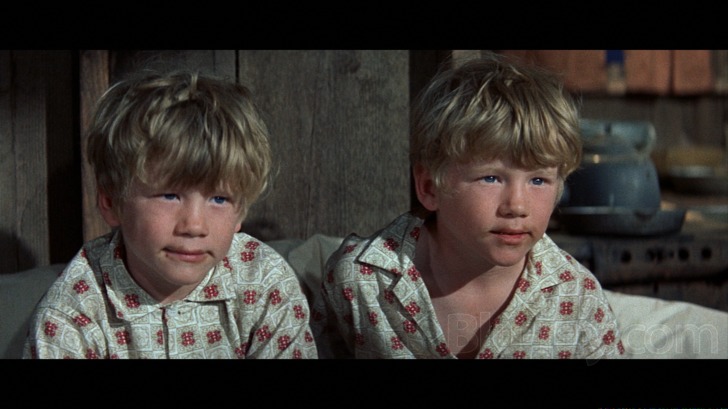
For some unknown reason, I often imagine Elvis' infamous manager and agent Col. Tom Parker as what I consider to be his counterpart in The Simpsons, the co-called "rich Texan" (maybe because Parker himself seemed to be something of a cartoon). It's easy to picture either iteration pitching this film to some midlevel bean counter in Hollywood. "Aw, shucks, fellas, just stick Elvis under a palm tree with a pretty girl—wait. . .two pretty girls—and have him sing a few songs, and it's like putting money in the bank." Once the Kwimper jalopy breaks down, the family has to do a lot of walking, so it's probably little wonder this film is so pedestrian. Elvis fans will no doubt be thrilled that Follow That Dream has made it to Blu-ray, and for them the good news is technical merits are excellent.
Similar titles
Similar titles you might also like

Robin and the 7 Hoods
1964

Frankie and Johnny
1966

Clambake
1967

It Happened at the World's Fair
Warner Archive Collection
1963

Monty Python Live (Mostly): One Down, Five to Go
2014

Reefer Madness: The Movie Musical
2005

The Blues Brothers 4K
40th Anniversary Edition
1980

A Hard Day's Night
1964

Blue Hawaii 4K
Paramount Presents #36
1961

Not the Messiah (He's a Very Naughty Boy)
2010

Spinout
Warner Archive Collection
1966

Double Trouble
Warner Archive Collection
1967

Lord of the Dance
Michael Flatley Returns
2011

Help!
The Beatles
1965

Car Wash
1976

Kid Galahad
1962

Marry Me
2022

Going My Way
75th Anniversary Edition
1944

Giuseppe Verdi: La Traviata
Teatro alla Scala
2007

Goin' to Town
1935
